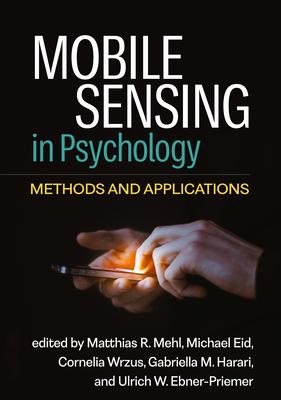How can large-scale, real-time, and real-world data on people’s behaviors, interactions, and environments improve psychological measurement, or lead to customized psychological interventions? Written expressly for social and behavioral scientists, this cutting-edge handbook describes the key concepts and tools of mobile sensing and explains how to plan and conduct a mobile sensing study. Renowned experts address the whats, whys, and how-tos of collecting "big data" using smartphones and other wearables, and explore which research questions can best be addressed with these tools. Modern statistical methods for analyzing mobile sensing data are described--for example, dynamic structural equation modeling, network modeling, and machine learning, including deep neural networks. The book includes best-practice research examples of applications in clinical psychology, aging, neuroscience, health, emotions, relationships, personality, the workplace, and other areas. Key methodological challenges and ethical/privacy issues are highlighted throughout.
| FindBook |
有 1 項符合
Mobile Sensing in Psychology: Methods and Applications的圖書 |
 |
Mobile Sensing in Psychology: Methods and Applications 出版社:Guilford Publications 出版日期:2023-11-20 語言:英文 規格:精裝 / 760頁 / 普通級/ 初版 |
| 圖書館借閱 |
| 國家圖書館 | 全國圖書書目資訊網 | 國立公共資訊圖書館 | 電子書服務平台 | MetaCat 跨館整合查詢 |
| 臺北市立圖書館 | 新北市立圖書館 | 基隆市公共圖書館 | 桃園市立圖書館 | 新竹縣公共圖書館 |
| 苗栗縣立圖書館 | 臺中市立圖書館 | 彰化縣公共圖書館 | 南投縣文化局 | 雲林縣公共圖書館 |
| 嘉義縣圖書館 | 臺南市立圖書館 | 高雄市立圖書館 | 屏東縣公共圖書館 | 宜蘭縣公共圖書館 |
| 花蓮縣文化局 | 臺東縣文化處 |
|
|
圖書介紹 - 資料來源:博客來 評分:
圖書名稱:Mobile Sensing in Psychology: Methods and Applications
內容簡介
作者簡介
Matthias R. Mehl, PhD, is Professor of Psychology at the University of Arizona. He is a social and personality psychologist interested in the conceptualization and measurement of how everyday social processes affect health and well-being. He employs mobile sensing methods for studying real-world social interactions and has pioneered a method that involves the unobtrusive sampling of ambient sounds via a smartphone app (the Electronically Activated Recorder, or EAR). Dr. Mehl has published extensively and given workshops on mobile sensing and other real-world psychological research methods. He is a Fellow of the Association for Psychological Science and the Society for Personality and Social Psychology.
Michael Eid, PhD, is Professor of Methods and Evaluation at the Free University of Berlin in Germany. His research focuses on measurement theory, in particular, the development of psychometric models for longitudinal and multimethod research. His more applied research contributions are in the area of subjective well-being, mood regulation, and health psychology. With respect to mobile sensing, Dr. Eid is especially interested in the psychometric foundation of multimethod mobile sensing research strategies and the modeling of intensive longitudinal data. Widely published, he has served as editor of several journals in the area of methodology and assessment. Cornelia Wrzus, PhD, is Professor of Psychological Aging Research at the Ruprecht-Karls University of Heidelberg, Germany, where she founded the Daily Life Lab. Her research focuses on socioemotional and personality development across the entire adult lifespan. Dr. Wrzus has published many articles on personality development, emotional processes, and social dynamics in daily life, using experience sampling, ambulatory physiological assessments, and mobile sensing. One particular concern is the integration of both open science standards and privacy protection in ambulatory assessment research of people’s daily lives. She has served on the editorial boards of several personality journals and is president-elect of the Society for Ambulatory Assessment. Gabriella M. Harari, PhD, is Assistant Professor in the Department of Communication at Stanford University, where she directs the Media and Personality Lab. Her research focuses on everyday behavior and its relationship to personality and well-being. She takes an ecological approach to conducting her research, emphasizing the importance of studying people in their natural physical and digital contexts. Over the last decade, Dr. Harari has published extensively on mobile sensing and given workshops about using the method for studying daily life. Ulrich W. Ebner-Priemer, PhD, is Professor of Psychology and Chair of the Mental mHealth (mobile health) Lab at the Karlsruhe Institute of Technology in Germany. His work is characterized by its methodological focus on ambulatory assessment, investigating phenomena of interest in everyday life and real time. He is particularly interested in a multimodal operationalization of phenomena of interest, combining e-diaries with wearables, and digital phenotypes; real-time analyses and real-time feedback; and analysis of dynamic processes. Dr. Ebner-Priemer provides the technological mHealth framework for studies on a broad range of mental disorders. He is former president of the Society for Ambulatory Assessment and current Chair of the ECNP Digital Health Network.
|









